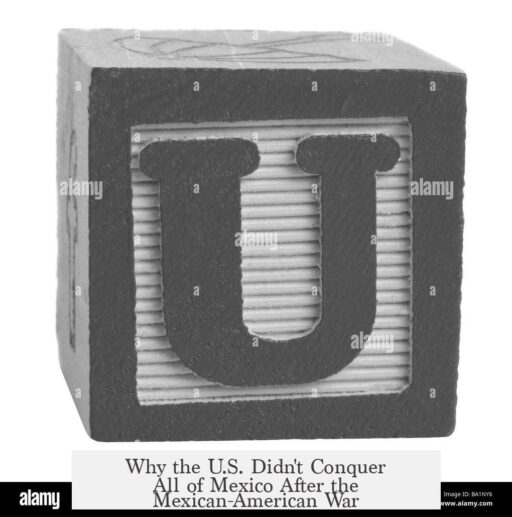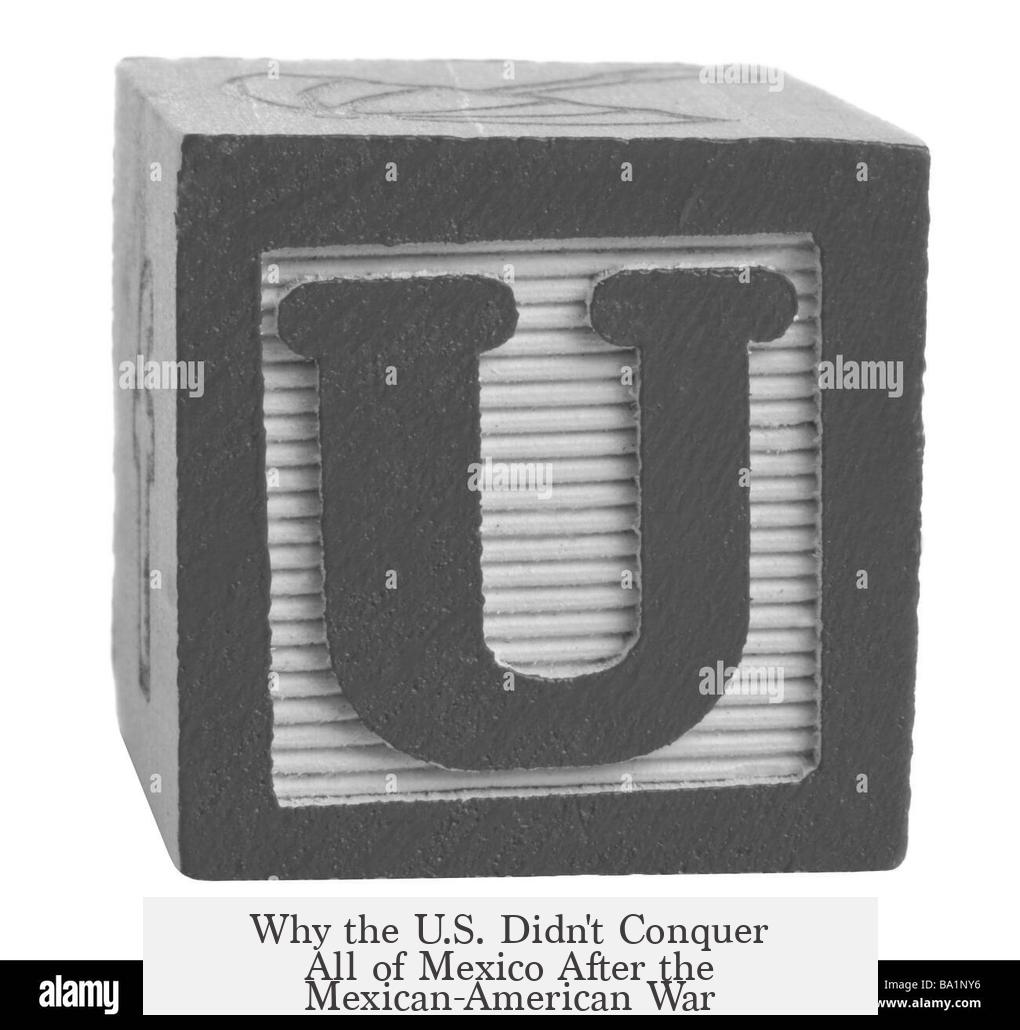The United States did not conquer all of Mexico after winning the Mexican-American War due to a combination of political opposition, military limitations, and strategic considerations rather than just racial attitudes.

Racism influenced American views but was not the main obstacle. While some politicians expressed concerns about race and religion, these were part of a broader political debate. The “all-Mexico” annexation idea never gathered majority support in Congress. John C. Calhoun, for example, used race and religion arguments to sway some politicians against acquiring all Mexican territory.
Most Whig politicians opposed expansion beyond the territories ultimately annexed. Many Northern Democrats also resisted further acquisition because they began to see the war as linked to slavery expansion. This opposition made it difficult to achieve consensus for complete conquest.

The U.S. military capacity was a crucial factor. During the war, the regular American army had fewer than 15,000 soldiers, supplemented by volunteers. The lands annexed contained fewer than one million Mexicans, a manageable number for garrisons. However, the rest of Mexico held over twenty million people. Controlling such a large population would have required a substantial, long-term military presence, which was unfeasible.
Many Americans distrusted a large standing army, especially Democrats who followed Jacksonian ideals. They feared empowering the military, traditionally led by Whigs, and were reluctant to expand it aggressively. With the 1848 election approaching, Democratic leaders wanted to avoid unpopular expansion debates that risked alienating voters, especially in the North.

Finally, President James K. Polk himself did not support annexing all of Mexico. Without executive backing, it was nearly impossible to move forward with such an uncertain and costly policy. The combination of political, military, and popular constraints prevented the full conquest of Mexico after the war.
- Racism played a part but was not the main reason against total annexation.
- Congressional opposition, especially from Whigs and Northern Democrats, limited expansion.
- Military forces were too small to control all of Mexico’s large population.
- Distrust of a large standing army and election politics shaped decisions.
- President Polk’s lack of support ended further annexation efforts.
Why Didn’t the United States Just Conquer All of Mexico After Winning the Mexican-American War?
Simply put, the U.S. didn’t just take over all of Mexico after winning the Mexican-American War because multiple practical, political, and social reasons made it impossible—and frankly unwise. Sure, they won the war, but victory on the battlefield doesn’t always translate into the ability or desire to annex an entire country. Let’s unpack the why behind this fascinating piece of history.
First off, many assume racism was the main reason for not conquering all of Mexico. It’s an easy conclusion, but not entirely accurate. Racism did influence opinions. Some Americans feared the cultural, racial, and religious differences with Mexico’s population. But race alone wasn’t the main stopping block. Other factors carried more weight in derailing any dreams of American expansion beyond what became the Treaty of Guadalupe Hidalgo’s terms.
Politics played a huge role. Remember, this was a time when the U.S. Congress was a hotbed of debate, with intense divisions over slavery and national identity. Within Congress, the faction supporting outright annexation of all Mexican lands never gained majority support. It was more like a fringe idea tossed around by few.
Interestingly, John C. Calhoun—a prominent Southern politician—used racial and religious arguments to persuade wavering Democrats to oppose annexing the entire country. He wasn’t arguing against expansion because he disliked conquest, but because annexing a vast Mexican territory would threaten the social order and potentially increase the number of non-white, Catholic citizens. His stance highlights how race was weaponized politically but wasn’t the only reason behind opposition.
Most Whigs, the other major political party, opposed any further Mexican land grabs. Many Northern Democrats also turned against the idea, viewing the war increasingly as a pro-slavery land grab. This combination of factors ensured that any push for total conquest never gained traction.
Then there’s the military reality. Hold on—it’s not just about winning battles; it’s about what happens after. The American army during the war was relatively small, never surpassing 15,000 regulars, bolstered by volunteers. That’s a decent fighting force for campaigns but not massive enough to occupy and control millions of people spread across a huge territory. The lands the U.S. did annex had fewer than a million Mexicans and were easier to manage.
Contrast that with the rest of Mexico, where over 20 million people lived. Holding such a vast place meant deploying tens of thousands of troops indefinitely. The logistical nightmare alone was enough to make officials think twice.
Worse, this period was characterized by deep-seated distrust of large standing armies. The Jacksonian democratic ideal frowned upon a permanent professional army, associating it with tyranny, and this ideal held significant sway among Democrats. Expanding the military to hold all of Mexico would mean building an institution many feared was dominated by their political rivals, the Whigs.
Politically, timing was crucial too. The 1848 election loomed large. Democrats worried that pressing the issue of further Mexican annexation would alienate northern voters opposed to slavery, as new territories raised the stakes in the slavery debate. The example of the Republic of Yucatan—an area eyed for potential annexation due to its white property-owning population—proved that further expansion was unpopular with some voters. Democrats didn’t want to risk losing elections to chase new lands.
Lastly, there was a lack of presidential backing. President James K. Polk, who initially pushed the Mexican-American War forward, didn’t support further annexation after the war ended. In U.S. politics, the executive branch’s support is critical in foreign affairs. Without Polk’s commitment, and later administrations unwilling to commit political capital and resources, expansion beyond the Treaty terms stalled completely.
So, why didn’t the U.S. just conquer all of Mexico? To sum it up:
- Race and religion played roles but were secondary to practical concerns.
- Congressional opposition was strong, especially from Northern Democrats and Whigs.
- Military limits made controlling a huge population unmanageable.
- Political fears about elections and expanding slavery created resistance.
- Lack of executive support halted foreign policy ambitions.
The U.S. took the lands it could reasonably govern and hoped to avoid the headaches of full annexation. If you imagine sitting in Polk’s shoes, would you want to govern a country with 20 million more people, many culturally different, when your army is small and your political support shaky? Probably not.
Historical lessons often hinge on details many miss when just scanning headlines. The Mexican-American War reshaped North America, but the U.S. kept its ambitions practical. It absorbed key territories like California and the Southwest, enough to fuel its “Manifest Destiny” dreams without risking overextension or civil unrest.
Curiously, this restraint probably helped America avoid even messier conflicts down the line. What if the U.S. had annexed all of Mexico? Would it have accelerated sectional conflicts and the Civil War, or created ongoing guerilla resistance forever? Historians debate, but it’s fair to say US leadership balanced victory with political and military realities.
In the end, winning a war doesn’t mean you conquer everything. Sometimes, the smartest victory is knowing how much to take—and just as importantly, what to leave alone.



